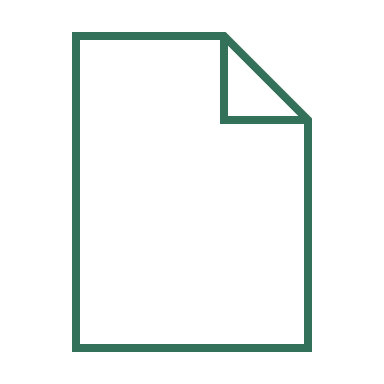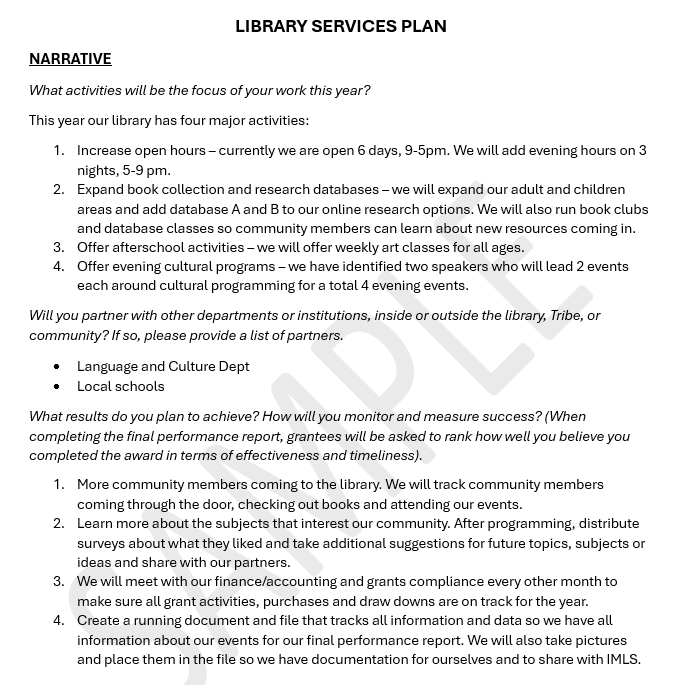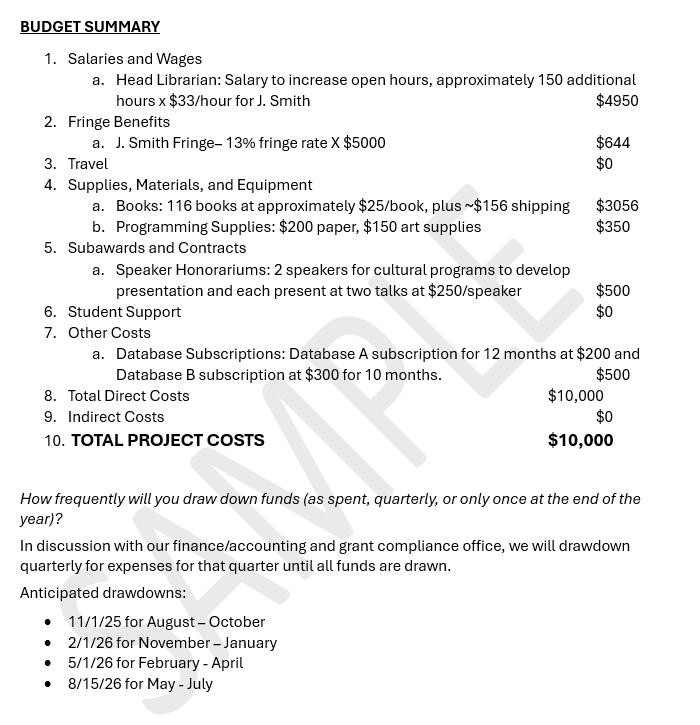FY25 Basic NOFO
fy25-ols-nab-NOFO_20241003.docx
Native American Basic Library - Notice of Funding Opportunity
FY25 NA Basic NOFO
OMB: 3137-0093
FY 2025 Notice of Funding Opportunity


Applications Due February 4, 2025


Native
American
Basic Grants
Funding
Opportunity Number: NAG-BASIC-FY25
Assistance
Listing Number: 45.311
OMB Control No.: 3137-0093
Expiration date: 2/28/2027
Table of Contents
Native American Basic Grants 1
1. Basic Information 5
2. Eligibility 8
3. Program Description 10
Prepare and Submit Your Application 17
4. Application Contents and Format 18
5. Submission Requirements and Deadlines 37
Learn About Application Review 39
6. Application Review Information 40
7. Award Notices 41
Find Post-Award Information 42
8. Post-Award Requirements and Administration 43
9. Other Important Information 46
Before You Begin
Months to weeks before the deadline, you should:
P repare
and confirm your required registrations.
repare
and confirm your required registrations.
Register in SAM.gov (registration can take several weeks). Your Tribe must have an active SAM.gov account and a Unique Entity Identifier (UEI) before you apply.
Register in Grants.gov (registration can take several days). You must have an active Grants.gov registration. You’ll need an active SAM.gov account and a Login.gov account to register and access Grants.gov.
See Registration Requirements and Guidance for Required Registrations.
C oordinate
internally.
oordinate
internally.
Your Tribe may require coordination between departments (e.g., library, human resources, finance, accounting, grants compliance, etc.). Consider this coordination early on, to ensure an on-time application proposal, thoughtful project design, and to ensure successful post-award administration and compliance.
After you’ve prepared your registrations and coordinated with your Tribe, be sure to:
S ubmit
your application in Grants.gov by the deadline:
ubmit
your application in Grants.gov by the deadline:
Applications are due by 11:59 p.m. U.S. Eastern Time on February 4, 2025.
B ookmark
these resources for important information:
ookmark
these resources for important information:
General Terms and Conditions for IMLS Discretionary Awards
Native American Basic Grants Program page (IMLS.gov)

T his
NOFO has internal links to help you quickly find what you need.
his
NOFO has internal links to help you quickly find what you need.
In
Adobe Reader, you can go back to where you were by pressing Alt +
Left
Arrow (Windows) or Command + Left Arrow (Mac) on your
keyboard.

Review the Opportunity
In this step:
1. Basic Information 5
2. Eligibility 8
Other Eligibility Information 8
3. Program Description 10
Agency Mission, Goals, and Objectives 10
NAB Program Goal and Objectives 11
Basic Information
Opportunity Overview
Federal Awarding Agency |
Institute of Museum and Library Services |
Funding Opportunity Title |
Native American Basic Grants |
Announcement Type |
New |
Funding Opportunity Number |
NAG-BASIC-FY25 |
Assistance Listing Number |
45.311 |
Type of assistance instrument |
Grant |
Application Deadlines |
Submit through Grants.gov by 11:59 p.m. U.S. Eastern Time on February 4, 2025. |
Award Overview
Key Dates |
|
Anticipated date of notification of award decisions |
June 2025 (subject to the availability of funds and IMLS discretion) |
Anticipated start dates for new awards |
Projects must begin on August 1, 2025. |
Anticipated period of performance |
August 1, 2025 – July 31, 2026. |
Funding Details |
|
Total amount of funding IMLS expects to award through this announcement |
$1,700,000 |
Anticipated number of awards |
170 |
Expected amount of individual awards |
$6,000 - $10,000 |
Average amount of funding per award experienced in previous years |
$10,000 |
The funding in the above Award Overview is subject to the availability of funds and IMLS discretion. We are not bound by any estimates in this announcement.
Contingent upon the availability of funds, the quality of applications, and IMLS discretion, we may make additional awards from the pool of unfunded applications from this competition.
Executive Summary
The Native American Basic Grants (NAB) program assists Native American Tribes in establishing, sustaining, and improving library services and operations with their communities. As information needs change, Tribal libraries must be able to serve as knowledge and resource centers to benefit their users and the wellness of their communities. The NAB program supports Tribes across the country to address their individual information needs and priorities.
Agency Contact Information
IMLS staff are available by phone and email to answer programmatic and administrative questions relating to this grant program. We also host webinars to introduce potential applicants to funding opportunities. For more information, see our list of webinars and instructions for accessing them.
Eligibility
Eligible Applicants
To be eligible for an award under this Native American Library Services Basic Grants Notice of Funding Opportunity, your Tribe must be Federally recognized, and offer library and/or archival services to the community. Such services may include, but are not limited to providing free access to:
books, print and electronic media;
research databases;
job, employment, and career resources;
reference desk services;
space for reading, studying, and meeting; and
events and activities such as programs, classes, and cultural events for all ages.
For the purpose of funding under this program, “Indian Tribe” (or “Tribe”) means any Tribe, band, nation, or other organized group or community, including any Alaska native village, regional corporation, or village corporation (as defined in, or established pursuant to, the Alaska Native Claims Settlement Act (43 U.S.C. § 1601 et seq.)), which is recognized as eligible for the special programs and services provided by the United States to Indians because of their status as Indians. The Bureau of Indian Affairs publishes updated lists of Federally recognized Indian Tribes in the Federal Register.
Cost Share Requirements
Cost sharing is not required in this program. Please do not include cost share in your budget.
Other Eligibility Information
Application Limits
A
 pplications
for renewal of your currently active IMLS awards are not eligible to
compete with applications for new awards.
pplications
for renewal of your currently active IMLS awards are not eligible to
compete with applications for new awards.If eligible, you may submit multiple applications for support of separate and distinct projects through other IMLS grant programs .
Partnerships and Collaborations
A
 pplications
involving partnerships or collaborations are welcome. Potential
partners can include other departments within the Tribe, Tribal
colleges and universities, school libraries, or local non-Tribal
libraries and non-profits.
pplications
involving partnerships or collaborations are welcome. Potential
partners can include other departments within the Tribe, Tribal
colleges and universities, school libraries, or local non-Tribal
libraries and non-profits.If the Tribe collaborates with a non-tribal partner, the Tribe must meet all eligibility requirements, serve as the lead applicant, and administer the award on behalf of the other(s).
If we fund the project, the Tribe will be programmatically, fiscally, and legally responsible for the award.
Ineligible Applicants
W
 e
will not review or make awards to ineligible applicants. We will
notify each applicant who is determined to be ineligible.
e
will not review or make awards to ineligible applicants. We will
notify each applicant who is determined to be ineligible.
To receive an IMLS award, your organization must be eligible and in compliance with applicable IMLS, administrative, and national policy requirements.
Application Completeness and Deadlines
Y
 ou
must submit all application components by the deadline indicated in
the Opportunity
Overview.
We won’t consider late applications for funding under this
notice.
ou
must submit all application components by the deadline indicated in
the Opportunity
Overview.
We won’t consider late applications for funding under this
notice.The total funding request on the IMLS Budget Form must be between $6,000 - $10,000.
Your application must be complete, and your project and budget must adhere to the program’s funding restrictions and application instructions.
Program Description
Agency Mission, Goals, and Objectives
The Institute of Museum and Library Services (IMLS)’s mission is to advance, support, and empower America’s museums, libraries, and related organizations through grantmaking, research, and policy development. Three agency-level goals, with two objectives each, guide our grantmaking.
Agency-Level Goal 1 Champion Lifelong Learning |
Objective 1.1 Advance shared knowledge and learning opportunities for all. Objective 1.2 Support the training and professional development of the museum and library workforce. |
Agency-Level Goal 2 Strengthen Community Engagement |
Objective 2.1 Promote inclusive engagement across diverse audiences. Objective 2.2 Support community collaboration and foster civic discourse. |
Agency-Level Goal 3 Advance Collections Stewardship and Access |
Objective 3.1 Support collections care and management. Objective 3.2 Promote access to museum and library collections. |
The Native American Library Services Basic Grants program supports the achievement of these agency-level goals and facilitates the delivery of significant results consistent with its federal authorizing legislation (20 U.S.C. § 9101 et seq.; in particular, § 9161 (Services for Native Americans)). Each award that we make through the NAB Program will align with one agency-level goal and one associated objective and will contribute meaningfully to the achievement of both program and agency-level goals.
S![]() earch
awards made through the NAB program by year, award, number, location
and keyword.
earch
awards made through the NAB program by year, award, number, location
and keyword.
NAB Program Goal and Objectives
Reflecting our agency-level goals, the NAB Program has one program goal and four objectives. Choose the objective that aligns best with your proposed project.
NAB Program Goal Improve library and archival services for accessing, learning, and preserving information with the community. |
|
Objective 1 Support the acquisition of library-related materials. |
Examples include, but aren’t limited to:
|
Objective 2 Support programming for identified community priorities. |
Examples include, but aren’t limited to:
|
Objective 3 Support training for library staff. |
Examples include, but aren’t limited to:
|
Objective 4 Support project activities that include aspects of two or more of the objectives listed above. |
|
Performance Measures
We use two performance measures as a basis for understanding how well the NAB program is meeting its goals and how awardees are managing individual projects.
E ffectiveness:
The
extent to which activities contribute to achieving the intended
results
of
the NAB program
ffectiveness:
The
extent to which activities contribute to achieving the intended
results
of
the NAB program
T![]() imeliness:
The
extent to which each task/activity is completed within the timeframe
proposed
imeliness:
The
extent to which each task/activity is completed within the timeframe
proposed
In your final performance report, we’ll ask you to rate how well you believe you completed the project in terms of effectiveness and timeliness.
Funding Restrictions
Allowable and Unallowable Costs
You may use IMLS funds and cost share only for allowable costs as found in IMLS and OMB government-wide cost-principle rules.
Please consult 2 C.F.R. part 200 and 2 C.F.R. part 3187 for additional guidance on allowable costs.
The following lists include some examples of generally allowable and unallowable costs.
A |
|
U |
|
You must explain all proposed expenses in the Budget Summary section of your Library Services Plan.
If you have questions about whether specific activities are allowable, contact us for guidance.
 Costs
for Third Parties
Costs
for Third Parties
When a project requires the payment of federal funds to third parties (such as partners, consultants, collaborators, vendors, and/or service providers), it is your responsibility to determine whether you should characterize a third party as a subrecipient or a contractor and include that determination in your agreement with them.
IMLS grant funds may not be provided to any federal agency serving as a third party.
Indirect Costs
Indirect costs aren’t allowed in this program.
Authorizing Statute and Regulations
S tatute:
20
U.S.C. § 9101 et seq.; in particular, §
9161 (Services for Native Americans).
tatute:
20
U.S.C. § 9101 et seq.; in particular, §
9161 (Services for Native Americans).
Regulations: 45 C.F.R. Chapter XI, 2 C.F.R. Chapter XXXI, and 2 C.F.R. Title 2
Award recipients must follow the IMLS regulations that are in effect at the time of the award*
You can find the Office of Management and Budget (OMB) Guidance for Federal Financial Assistance at 2 C.F.R. part 200.
*Please note: OMB has recently updated the Uniform Guidance (see Uniform Guidance Revisions). For IMLS awards made after October 1, 2024, the Uniform Guidance Revisions will apply. We have tried to align this NOFO to the Uniform Guidance Revisions. In the event of any differences between the Uniform Guidance Revisions provisions and the current (pre-Oct. 1, 2024) Uniform Guidance provisions, the Uniform Guidance Revisions provisions shall govern.
With certain IMLS-specific additions, IMLS regulations at 2 C.F.R. part 3187 have formally adopted the Uniform Guidance Revisions when they became effective on October 1, 2024.
Equal Opportunity
IMLS does not discriminate on the basis of race, color, national origin, sex, disability, or age.
For further information, email the Civil Rights Officer at [email protected] or write to the Civil Rights Officer, Institute of Museum and Library Services, 955 L’Enfant Plaza North, SW, Suite 4000, Washington, DC, 20024-2135.

Prepare and Submit Your Application
In this step:
4. Application Contents and Format 18
Guidance for Required Registrations 19
Instructions for Required Application Components 23
Disclosure of Information in Applications 36
5. Submission Requirements and Deadlines 37
Programmatic, Administrative and Technical Support Contacts 37
Application Contents and Format
Get Ready to Apply
Readiness Checklist
Be
sure to…
Register in SAM.gov (or make sure
your Tribe’s registration is current) as early as possible.
Remember that SAM registration can take several weeks.
To register, go to SAM.gov
Entity Registration and click Get Started.
See the SAM.gov
Entity Registration checklist for what you’ll need to
register in SAM.
Get a Unique Entity Identifier
(UEI) number. You’ll get your organization’s UEI when
you register in SAM.gov.
(This is not a DUNS number. See the DUNS
to UEI transition information.)
Carefully read through this NOFO
to get a good understanding of how
to craft your Library Services Plan and what
other documents we require.
Review
the eligibility requirements and confirm that your Tribe is
eligible.
Federally recognized Indian Tribe, including Alaska Native
Village, Regional Corporation, or Village Corporation
Offers library and/or
archival services to the community
Review
the Funding Restrictions and keep them in mind as you develop
your application and budget.
Review the post-award
requirements to make sure you can meet them. Find
the application package. Go to Grants.gov
and search for Funding Opportunity Number:
NAG-BASIC-FY25 or Assistance Listing Number:
45.311.
Get familiar with Grants.gov
Workspace.
Contact
IMLS program staff to discuss
your ideas, or if you have questions related to the application
process.
Applying for an award
takes time. Registering with SAM.gov can take several weeks. There
are a few important things you’ll need to do before you can
apply.

Registration Requirements
Before you apply, your Tribe must have these three Federal registrations already in place:
a Unique Entity Identifier (UEI) number;
a current and active System for Award Management (SAM) registration; and
an active Grants.gov registration with an approved Authorized Organization Representative (AOR).
Check your materials and registrations now to ensure that they are accurate, current, and active.
We strongly recommend that you obtain a UEI number and complete registration with SAM and Grants.gov months to weeks before the application deadline.
Guidance for Required Registrations
Getting a Unique Entity Identifier
The Unique Entity Identifier (UEI) number is a non-proprietary alphanumeric identifier assigned to all entities (public and private companies, individuals, institutions, or organizations) who register to do business with the Federal Government. The UEI is requested in, and assigned by, the System for Award Management (SAM).
If your Tribe has an active SAM registration, you can find your assigned UEI in your SAM record. If you don’t yet have an active SAM registration, you will receive a UEI when you register in SAM.
Registering with SAM
The System for Award Management (SAM) is a federal repository that centralizes information about grant applicants and awardees. It is always free to all users. You must register with SAM before registering with Grants.gov. Learn how to check a Tribe’s registration status in SAM.
If you’re registering with SAM for the first time, you must begin by creating a SAM user account through Login.gov. Click here to learn how to create a secure Login.gov account. Then proceed to the SAM registration process.
We recommend that you allow several weeks to complete the SAM registration.
You must always maintain an active SAM registration with current information while you have an active award or an application under consideration. We can’t make an award to you until you have complied with all applicable UEI and SAM registration requirements. If you have not fully complied with the requirements by the time we’re ready to make a Federal award, we may make a Federal award to another applicant.
You must renew your Tribe’s registration in SAM at least every 12 months or whenever your Tribe’s information changes. An expired registration will prevent you from submitting applications via Grants.gov and receiving awards or payments. Award payments will be made to the bank account that is associated with your Tribe’s SAM registration.
Registering with Grants.gov
Grants.gov is the centralized website for grant seekers to find and apply for federal funding opportunities. Grants.gov is owned and operated by the Federal Government and is always free to all users.
You must register with Grants.gov prior to applying. The multistep registration process cannot be completed in a single day. You should make sure your institution’s SAM registration is current and active before registering with Grants.gov. If your Tribe is not already registered, allow several weeks before the application deadline to complete this one-time process. Do not wait until the day of the application deadline to register.
The Grants.gov user ID and password you obtain when you register are required to submit your application.
After your Tribe registers with Grants.gov and creates an Organizational Applicant Profile, the request for the Tribe’s Grants.gov roles and access is sent to the eBiz POC. The eBiz POC will then log into Grants.gov and assign the appropriate roles to individuals within the Tribe. This will include the Authorized Organization Representative (AOR) which will give permission to complete and submit applications on behalf of the organization.
T IP:
Know who your Tribe’s Authorized Organization Representative
(AOR) is and be sure they’re aware of when you’ll need
them available to approve your application submission in Grants.gov.
Add additional AORs if you can.
IP:
Know who your Tribe’s Authorized Organization Representative
(AOR) is and be sure they’re aware of when you’ll need
them available to approve your application submission in Grants.gov.
Add additional AORs if you can.
Designating more than one AOR when you register in Grants.gov will help you avoid missing the deadline if a single AOR is unavailable when you are ready to submit the application.
It is also important to update the contact information and password in Grants.gov whenever an AOR changes. AOR changes can take over 24 hours to go into effect, so complete this well before the deadline.
Visit Grants.gov/Support, email [email protected], or call Grants.gov Applicant Support at 1-800-518-4726 for technical assistance. Grants.gov Applicant Support is available 24 hours a day, seven days a week, except for Federal holidays.
Application Package
You must apply electronically through Grants.gov Workspace or a Grants.gov system-to-system solution.
Use one of the following identifiers to locate the application package in Grants.gov:
Funding Opportunity Number: NAG-BASIC-FY25
Assistance Listing Number: 45.311
To request an audio recording of this announcement, call 202-653-4744. To request a paper copy of this announcement, call 202-653-4744 or email [email protected].
Persons who are deaf or hard of hearing (TTY Users) can contact IMLS at 202-207-7858 via 711 for TTY-Based Telecommunications Relay Service.
Prepare Your Application
This section outlines the components, format, and content requirements to help you prepare a complete application.
You must apply by 11:59 p.m. U.S. Eastern Time on February 4, 2025. We make awards only to eligible applicants that submit applications through Grants.gov on or before this deadline.
If your application is missing any Required Documents from the list below, we will consider it to be incomplete, and may reject it from further consideration (see 2 C.F.R. § 3187.9.).
Application Components
Format, Name, and Sequence of Application Components
Document Format
The SF-424S and the IMLS Library - Discretionary Program Information Form are web forms you’ll complete in Grants.gov Workspace. You must submit the Library Services Plan and the IMLS Budget Form as PDF documents.
Naming Convention
Use the naming conventions indicated in the table below.
I MPORTANT:
Attachment file names are limited to the following characters: A-Z,
a-z, 0-9, underscore (_), hyphen (-), space, period (.). If
attachment file names use any other characters, the application may
be rejected by Grants.gov.
MPORTANT:
Attachment file names are limited to the following characters: A-Z,
a-z, 0-9, underscore (_), hyphen (-), space, period (.). If
attachment file names use any other characters, the application may
be rejected by Grants.gov.
Attachment Order
In Grants.gov, attach all application components in the sequence listed in the table below.
Required Documents
You must include all required components for your application to be complete.
Component |
File Requirements |
The Application for Federal Domestic Assistance/Short Organizational Form (SF-424S) |
Format: Grants.gov web form |
IMLS Library – Discretionary Program Information Form |
Format: Grants.gov web form |
Library Services Plan |
File Format: PDF Page Limit: up to 2 pages File Name: Plan.pdf |
IMLS Budget Form |
File Format: IMLS PDF form File Name: Budget.pdf |
Instructions for Required Application Components
Application for Federal Domestic Assistance/Short Organizational Form (SF-424S)
The SF-424S is part of the application package that you complete in Grants.gov Workspace. We use it to collect some basic information about your Tribe and your project.
SF-424S Item |
Instructions |
Items 1 - 4 |
Grants.gov automatically populates items 1-4. |
Item 5. Applicant Information |
Use the following format: two-letter state abbreviation, followed by a hyphen, followed by a zero, followed by the two-digit district number. For example, if the Tribe is located in the 5th Congressional District of California, enter “CA-005.” For the 12th Congressional District of North Carolina, enter “NC-012.” For states and territories with “At Large” Congressional Districts—that is, one representative or delegate represents the entire state or territory—use “001,” e.g., “VT-001.If your Tribe does not have a congressional district (e.g., it is located in a U.S. territory that does not have districts), enter “00-000.” To determine your Tribe’s district, visit the House of Representatives website and use the “Find Your Representative” tool. |
Item 6. Project Information
|
NOTE: We use Login.gov for user authentication in our electronic grants management system, eGMS Reach. Login.gov helps protect user identity through stronger passwords and two-factor authentication. e |
Item 7. Project Director
|
The Project Director will have primary responsibility for carrying out your project’s activities. Enter the requested information for this individual here. We require that the Project Director be a different person than the Authorized Representative. |
Item 8. Primary Contact/Grants Administrator
|
The Primary Contact/Grants Administrator has the core responsibility for administering the award. Enter the requested information for this individual here. Please still complete both items 8 and 9 if the Primary Contact/Grants Administrator is the same as the Authorized Representative. In some Tribes this individual may be the same as the Project Director. If this is the case, check the box and skip to Item 9. |
Item 9. Authorized Representative
|
The Authorized Representative has the authority to legally bind your Tribe. Enter the requested information for this individual here. The Authorized Representative cannot be the same person as the Project Director. By checking the “I Agree” box at the top of Item 9, this individual certifies the applicant’s compliance with the IMLS Assurances and Certifications and any other relevant federal requirements. Grants.gov automatically populates the “Signature of Authorized Representative” and “Date Signed” boxes upon submission of the application. This is the person whose name was listed as your Tribe’s authorized representative when you registered with Grants.gov. Please note that this name might not be the same as the name and other information you entered in Item 9 above. |
By submitting the electronic application, you acknowledge that your Tribe certifies compliance with relevant federal requirements, including but not limited to the IMLS Assurances and Certifications, to the same extent as a signature does on a paper application.
IMLS Library – Discretionary Program Information Form
The IMLS Library - Discretionary Program Information Form is part of the application package that you complete in Grants.gov Workspace. In it, we collect more details about your project, its goals, and financial information.
Sections of this form are dynamic, so your answers to certain questions will determine what questions you see next.
PIF Section |
Instructions |
Section 1. Grant Program |
Select Native American Basic Grants. |
Grant Program Goals and Objectives |
Refer to the NAB Program Goal and Objectives. Select the objective that best aligns with your proposed project. |
Section 2. Applicant Information |
Does this entity have an organizational unit (department, school, Tribal college or university, or non-Tribal library or non-profit) that will carry out the activities described in your application? Refer to the entity listed in Item 5a of the Grants.gov SF-424S Form that you are submitting with your application and review the Helpful Definitions of organizational unit and legal applicant on the Program Information Form. Select YES if your Tribe has an organizational unit, then provide the requested information and select an institution type for the organizational unit. Select NO if your Tribe does not have an organizational unit, then select an institution type for your Tribe. |
Section 4. Funding Request |
Refer to the Grant Fund total in Section 10 of the IMLS Budget Form (PDF, 1.6MB) that you are submitting with your application. Provide the amount in dollars that you are requesting from IMLS (between $6,000 - $10,000). For Cost Share, enter “0” because this program does not allow cost share. |
Section 5. Indirect Costs |
Indirect costs are not allowed in this program. Please select “Applicant chooses not to include indirect costs.” |
Section 6. Abstract |
Write a one- or two-sentence summary of your Library Services Plan. You may choose to simply reuse the Project Description written for the SF424S. If your proposal is selected for funding, the Abstract may be published online, or otherwise shared, by IMLS. As such, it must not include any sensitive, proprietary, or confidential information. |
Section 7. Project Keywords |
Select from one to eight keywords that best characterize your project from the options provided on the form. You can find the full list of keywords below. We may use these keywords as search terms in our compilations describing the agency’s grantmaking and/or provide them as tools to help applicants, other awardees, and the public understand more about what we support. |
Keywords
In Section 7 of the IMLS Library – Discretionary Program Information Form, we ask you to select from one to eight keywords that best characterize your project from the options that appear alphabetically below. We may use these keywords as search terms in our compilations describing the agency's grantmaking and/or provide them as tools to help applicants, other awardees, and the public understand more about what we support.
A-B-C
D-E-F-G
H-I-J-K-L
M-N-O
|
P-Q-R-S
T-U-V-W-X-Y-Z
|
Library Services Plan
Create a document using these guidelines and tips as you respond to questions for the two sections below:
We recommend limiting the Library Services Plan to two single-spaced, numbered pages.
Use at least 0.5-inch margins on all sides, standard font, and font size of at least eleven points.
Be clear and concise with a minimum of technical jargon and acronyms.
Save your document as a PDF and use Plan.pdf as its file name.
Organize your Library Services Plan into two section headings: Narrative and Budget Summary. Please address the following questions in each section.
Narrative
What activities will be the focus of your work this year?
Will you partner with other departments or institutions, inside or outside the library, Tribe, or community? If so, please provide a list of partners.
What results do you plan to achieve?
How will you monitor and measure success? (When completing the final performance report, you will be asked to rank how well you believe you completed the award in terms of effectiveness and timeliness).
See below for an example of what the Narrative section of a Library Services Plan might look like.

Figure 1 - Example Library Services Plan Narrative
Budget Summary
Follow the order of the IMLS Budget Form’s section headings and explain how you determined each line-item dollar amount.
How frequently will you draw down funds (as spent, quarterly, or only once at the end of the year)?
See below for an example of what the Budget Summary section of a Library Services Plan might look like.

Figure 2 - Example Library Services Plan Budget Summary
IMLS Budget Form
Make sure that JavaScript is enabled in your web browser. Download the IMLS Budget Form (PDF, 1.6MB) to your computer and work on it outside your web browser. When you’ve completed the form, save it as a PDF and upload it as part of your application through Grants.gov.
 The
IMLS Budget Form accommodates up to three years of project activities
and expenses, but this program will only require use of the “Year
1, Grant Fund” column.
The
IMLS Budget Form accommodates up to three years of project activities
and expenses, but this program will only require use of the “Year
1, Grant Fund” column.
T ips
for completing your budget form:
ips
for completing your budget form:
The budget should include the project costs that will be charged to grant funds.
All the items listed must be necessary to accomplish project objectives, allowable according to the applicable federal cost principles, auditable, and incurred during the award period of performance.
Charges to the project for items such as salaries, fringe benefits, travel, and contractual services must conform to the written policies and established practices of your Tribe.
If you need more lines for a specific section, summarize the information in the IMLS Budget Form and explain it further in the Budget Summary.
Budget Form Section |
Instructions |
|
Include both temporary and permanent staff engaged in project activities. Document the method of cost computation in your Budget Summary by including the base salary or wages for each person and the percentage of time each person is allocated to the project activities, which may be shown as a percentage of time, number or days, or number of hours. |
|
Fringe benefits can be claimed as a direct cost for only those positions included in your direct cost pool and only on the portion of salaries and wages identified for this project. Indicate your Tribe’s fringe benefit rate (in percent) and the base (in dollars) to which the rate is applied (e.g., 20% x $175,089.00). |
|
Explain the method of cost computation for each travel cost, including subsistence, lodging, and transportation, in your Budget Justification. You must use the lowest available commercial fares for coach or equivalent accommodations, and you must use U.S. flagged air carriers for foreign travel when such services are available, in accordance with applicable U.S. legal requirements. |
|
List the costs of supplies, materials, and equipment purchased specifically for the proposed project. For definitions and other information, please see 2 C.F.R. part 200. Explain or describe these items in further detail in the Budget Summary. |
|
List each third party that will undertake project activities and their associated costs as an individual line item on your IMLS Budget Form. Designate each third party as either a subaward or a contract using the dropdown menu on each line. Itemize these third-party costs in your Budget Summary. |
|
If your project includes Student Support costs, enter them in this section. Refer to Student Support Costs in the Budget for a definition and examples. |
|
Use this section for costs that cannot be assigned to other categories. Do not use this section to list items that do not fit in the lines allotted for another section. |
|
These amounts will total automatically. |
|
Indirect costs are not accepted for this funding opportunity. |
|
These amounts will total and round up to the nearest dollar automatically. |
Student Support Costs in the Budget
Students are:
Individuals enrolled in a community college, undergraduate, or graduate program of study
Individuals participating in post-master’s or post-doctoral programs that are focused on supporting their careers or professional development
Library, archives, and museum staff participating in education and training activities focused on their careers or professional development
Examples of Student Support include:
Tuition support for students participating in the project
Salaries or stipends for graduate assistant work, if their work is focused on research and teaching activities (therefore contributing to their education)
Pay and benefits for a resident or fellow to work in a position that is intended to support their learning outcomes or professional development
Costs for travel and conference registration provided to support a student or participant’s learning outcomes or professional development
Costs of supplies and equipment provided to students to support a student’s learning outcomes or professional development
Activities not considered Student Support include:
Students employed in roles that are primarily administrative or clerical, doing work that is not primarily focused on their career or professional development. These costs should be listed in the Salaries and Wages section of the budget, and tuition paid on behalf of these students would not be considered Student Support.
See 2 C.F.R. § 200.466 (Scholarships and student aid costs); see also 2 C.F.R. § 200.430 (Compensation – personal services).
Application Checklist
Use this checklist to make sure you have everything you need to submit a complete application.
General Readiness |
|
Forms (follow form and Grants.gov instructions) |
Files Formatting Instructions |
|
Disclosure of Information in Applications
We may share grant applications, products, and reports to further the mission of the agency and the development of museum, library, archival, and information services. As a general practice, and except for information that is privacy-protected, information contained in IMLS applications that receive funding may be made public. Please identify any information you deem confidential and/or proprietary and seek to have protected.
Submission Requirements
and Deadlines
Submission Instructions
You must submit your applications for funding using Grants.gov Workspace. Do not submit through email or postal mail to IMLS.
Review the Registration Requirements and time frames. We strongly recommend that you obtain a UEI number, register with SAM and Grants.gov, and complete and submit your application early. Leave plenty of time and use the contact information below to reach out to IMLS, the Federal Service Desk, or Grants.gov Help for questions and technical difficulties.
Programmatic, Administrative and Technical Support Contacts
IMLS
IMLS staff are available by phone and email to answer programmatic and administrative questions relating to this grant program. We also host webinars to introduce potential applicants to funding opportunities. For more information, see our list of webinars and instructions for accessing them.
Federal Service Desk
Visit the Federal Service Desk or call 1-866-606-8220 for questions about registering or renewing your registration with login.gov or SAM.gov. Hours of operation are Monday through Friday, 8 a.m. to 8 p.m. Eastern Time.
Grants.gov
Visit Grants.gov Support, email [email protected], or call Grants.gov Applicant Support at 1-800-518-4726 for assistance with software issues, registration issues, and technical problems. Grants.gov Applicant Support is available 24 hours a day, seven days a week, except for federal holidays.
Be sure to obtain a case number when calling the Federal Service Desk or Grants.gov for support.
Submission Dates and Times
You must submit your applications for funding using Grants.gov Workspace. Do not submit through email or postal mail to IMLS.
For the NAB program, Grants.gov will accept applications through 11:59 p.m. U.S. Eastern Time on February 4, 2025.
We award grants only to eligible applicants that submit complete applications, including attachments, through Grants.gov, on or before the deadline, as indicated by the date stamp generated by Grants.gov.
Grants.gov will generate a series of emails confirming the status of each application. Applicants can check the status of their application(s) in Grants.gov by using “Track My Application.” For further details, visit Check Application Status at Grants.gov.
Emergency Extensions
Under certain circumstances, we allow an extension of grant application deadlines for adversely affected applicant Tribes located in counties listed in Emergency Declarations and/or Major Disaster Declarations. See Application Deadlines for further information.
Intergovernmental Review
This funding opportunity is not subject to intergovernmental review per Exec. Order No. 12372.

Learn About Application Review
In this step:
6. Application Review Information 40
Eligibility and Completeness Checks 40
Review and Selection Process 40
7. Award Notices 41
Application Review Information
Eligibility and Completeness Checks
We assess every application to make sure it meets basic requirements for eligibility and completeness.
We won’t consider an application that:
does not meet the eligibility criteria for the program
is submitted after the deadline.
If your application is rejected during these initial eligibility and completeness checks, we’ll notify you by email. If you believe we rejected your application in error, you can appeal the decision in writing within ten business days of the date we sent the rejection notice.
Review and Selection Process
Basic Grants are non-competitive awards available to eligible applicants to support library operations and maintain library and archival services with Tribes.
Award Notices
We will not release information about the status of an application until we have completed all deliberations.
We expect to notify applicants of funding decisions by email in June 2025.
Notifying Funded Applicants
If your application is successful, we’ll send your Authorizing Official, Project Director, and Grant Administrator an email notification with our congratulations and instructions for accessing our electronic grants management system, eGMS Reach. Once you activate your eGMS Reach account, you’ll have access to your Official Award Notification, award letter, reporting schedule, and IMLS-approved budget document.
T he
Official Award Notification is the only document obligating funds and
authorizing you to begin performance on its specified dates. Unless
you’ve confirmed and received prior written approval from us
that pre-award costs are allowed, incurring those costs before the
period of performance is at your own risk.
he
Official Award Notification is the only document obligating funds and
authorizing you to begin performance on its specified dates. Unless
you’ve confirmed and received prior written approval from us
that pre-award costs are allowed, incurring those costs before the
period of performance is at your own risk.
Notifying Non-Funded Applicants
If your application is non-funded, we’ll send your Authorizing Official, Project Director, and Grant Administrator an email notification to let you know. We’ll share the number of applications and the total of requested funding we received for the program this year. You can also contact us to help you understand the decision and decide whether to revise the proposal and submit it again to IMLS or another funding agency in the future.
.

Find Post-Award Information
In this step:
8. Post-Award Requirements and Administration 43
Post-Award Requirements and Administration
Administrative and National Policy Requirements
There are important laws and regulations you’ll need to understand and comply with if you receive an award. Awardees are subject to:
2 C.F.R. part 200 Uniform Administrative Requirements, Cost Principles, and Audit Requirements for Federal Awards, 2 C.F.R. part 3187;
The IMLS General Terms and Conditions for IMLS Discretionary Gr ant and Cooperative Agreement Awards; and
Applicants for federal funds must certify that they are responsible for complying with certain nondiscrimination, debarment and suspension, drug-free workplace, and lobbying laws. These are set out in more detail, along with other requirements, in the IMLS Assurances and Certifications. By submitting the application, which includes these Assurances and Certifications, you certify that you are in compliance with these requirements and that you will maintain records and submit any reports that are necessary to ensure compliance. Failure to comply with these statutory and regulatory requirements may result in the suspension or termination of an award and require that the awardee return funds to the government.
For information about award termination, please see the IMLS General Terms and Conditions for IMLS Discretionary Grant and Cooperative Agreement Awards and 2 C.F.R. § 200.340.
Please note: OMB has recently updated the Uniform Guidance (see Uniform Guidance Revisions). For IMLS awards made after October 1, 2024, the Uniform Guidance Revisions apply. We have tried to align this NOFO to the Uniform Guidance Revisions. In the event of any differences between the Uniform Guidance Revisions provisions and the current (pre-October 1, 2024) Uniform Guidance provisions, the Uniform Guidance Revisions provisions shall govern.
With certain IMLS-specific additions, IMLS regulations at 2 C.F.R. part 3187 have formally adopted the Uniform Guidance Revisions when they became effective on October 1, 2024.
Reporting
Awardees must comply with the following reporting requirements.
Financial and performance reports are due according to the reporting schedule in your official award documents. You must submit your performance and financial reports in eGMS Reach. We may publish interim and final performance report content on the IMLS website.
You must also comply with 2 C.F.R. §§ 180.335 and 180.350 and 2 C.F.R. part 3185 with respect to providing information regarding all debarment, suspension, and related offenses, as applicable.

Other Information
In this section:
9. Other Important Information 46
Conflict of Interest Requirements 46
Additional Information about IMLS 47
IMLS Obligations to Make Awards 47
Other Important Information
Acknowledging IMLS Support
Awardees must include acknowledgement of IMLS support in all grant products, publications, websites, and presentations developed with IMLS funding.
All work products should reference IMLS and include the associated award number(s). Our Grantee Communications Kit provides guidance for fulfilling these requirements.
Conflict of Interest Requirements
As a non-federal entity, you must follow IMLS conflict of interest policies for federal awards. You must disclose in writing any potential conflict of interest to an IMLS Program Officer, or to the pass-through entity if you are a subrecipient or contractor. This disclosure must take place immediately whether you are an applicant or have an active IMLS award.
The IMLS conflict of interest policies apply to subawards as well as contracts, and are as follows:
As a non-federal entity, you must maintain written standards of conduct covering conflicts of interest and governing the performance of your employees engaged in the selection, award, and administration of subawards and contracts.
None of your employees may participate in the selection, award, or administration of a subaward or contract supported by a federal award if he or she has a real or apparent conflict of interest. Such a conflict of interest would arise when the employee, officer, agent, board member, or any member of his or her immediate family, his or her partner, or an organization which employs or is about to employ any of the parties indicated herein, has a financial or other interest in or a tangible personal benefit from an organization considered for a subaward or contract. The officers, employees, agents, and board members of the non-federal entity must neither solicit nor accept gratuities, favors, or anything of monetary value from subrecipients or contractors or parties to subawards or contracts.
If you have a parent, affiliate, or subsidiary organization that is not a state, local government, or Tribe, you must also maintain written standards of conduct covering organizational conflicts of interest. Organizational conflicts of interest means that because of relationships with a parent company, affiliate, or subsidiary organization, you are unable or appear to be unable to be impartial in conducting a subaward or procurement action involving a related organization.
Additional Information about IMLS
Visit the IMLS website for additional information on IMLS and IMLS activities.
IMLS Obligations to Make Awards
This announcement does not obligate IMLS to make any federal award or commitment.
Copyright Information
Awardees may copyright any work that is subject to copyright and was developed under an award or for which ownership was acquired under a federal award. IMLS reserves a royalty-free, nonexclusive, and irrevocable right to reproduce, publish, or otherwise use the work for federal purposes and to authorize others to do so. For additional information, please see 2 C.F.R. § 200.315 (Intangible property).
Application Completion Time
Complete applications include the elements listed in the Table of Application Components. IMLS estimates the average amount of time needed for one applicant to complete the Library Services Plan portion of this application to be 3 hours. This includes the time for reviewing instructions, searching existing data sources, gathering and maintaining the data needed, and writing and reviewing the answers.
IMLS estimates that it will take an average of 30 minutes per response for the SF-424S and IMLS Library – Discretionary Program Information Form and three hours per response for the IMLS Budget Form.
We welcome your suggestions for improving this collection of information and for making it as easy to use as possible. Send comments regarding this burden estimate or any other aspect of this collection of information, including suggestions for reducing this burden, to our Office of Grants Policy and Management. Please note that applicants are not required to respond to any collection of information unless it displays a currently valid U.S. Office of Management and Budget (OMB) control number.
PRA Clearance Number
OMB Control No.: 3137-0093, Expiration date: 2/28/2027

| File Type | application/vnd.openxmlformats-officedocument.wordprocessingml.document |
| File Title | Native American Basic Grants FY2025 Notice of Funding Opportunity |
| Subject | Native American Basic Grants FY2025 Notice of Funding Opportunity |
| Author | [email protected] |
| File Modified | 0000-00-00 |
| File Created | 2024-10-07 |
© 2026 OMB.report | Privacy Policy
 llowable
Costs
llowable
Costs nallowable
Costs
nallowable
Costs